Community Building - Our Blueprint Negev Strategy
Revitalizing Southern Israel
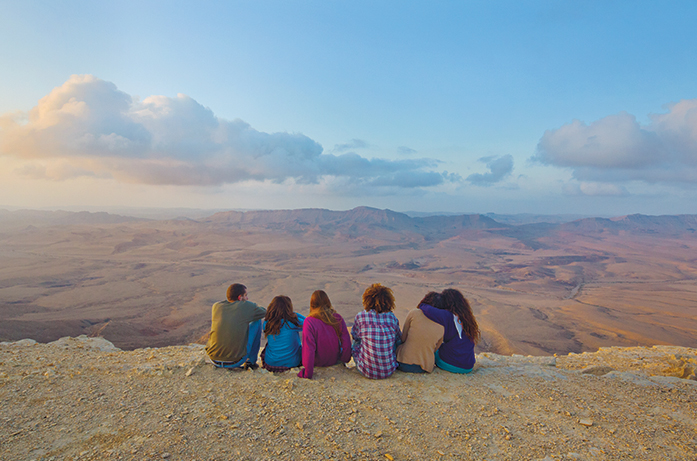
The Negev Desert represents 60% of Israel’s landmass but is home to just 8% of the country’s population. And in those lopsided numbers, we see an unprecedented opportunity for growth.
Jewish National Fund's major initiative to revitalize Southern Israel is Blueprint Negev. An interdisciplinary, internationally recognized campaign, Blueprint Negev aims to improve quality of life for all residents of the region and encourage a population shift away from crowded, expensive central Israel. Today,
JNF’s Blueprint Negev calls for the population of the south to double in size. These cities are setting the pace to make that dream a reality.
Our goal is to bring 500,000 new residents to the Negev. But before that happens, anyone looking to settle amid that arid landscape must stare down its challenges: A scarce water supply and the task of building sewage, irrigation and energy systems; a lack of infrastructure for housing; a lack of amenities to support a good quality of life; and a need for more job opportunities. Many areas in which JNF has invested are proving that our master plan is on the fast track to success. Here’s how it’s happening.
WORLD ZIONIST VILLAGE

Imagine a conversation about Israel, about the future of Jewish leadership, about the next 25-50 years, wherein high school students, college students, post-graduates, teachers, young leaders, and older adults are all part of one loud crescendo of voices. Imagine the discourse. Imagine the brilliance. Imagine the outcome. Imagine the future.
With the vision of creating this eco-system – the only one of its kind in the world – for global Jewry of all ages to convene at once or at different times on a single campus with programming, shared spaces, accommodations, and harnessing the power of positive Israel/Jewish conversation, Jewish National Fund is building this world class campus in Be’er Sheva that will revolutionize Zionist and Jewish educational engagement for the decades ahead.
Plans for the state-of-the-art campus include:
· INTERNSHIP INNOVATION AND TECHNOLOGY CENTER for college graduates and post-grads who seek an internship experience abroad with world-renowned high-tech companies near the campus for one year or more;
· ZIONIST EDUCATION CENTER for Jews from around the world to come to learn and connect, including an Israel 101 Adult Program and an Israel Studies Teachers Institute*
· THE NEW SOUTHERN CAMPUS OF ALEXANDER MUSS HIGH SCHOOL IN ISRAEL to accommodate a growing global high school student population at the premier college prep study abroad program in the world that has educated more than 28,000 teenagers since 1972.
· HIGH QUALITY CONFERENCE CENTER FACILITIES as well as comfortable modern accommodations for programs and short- and long-term stays. Facilities will include all technology needed for seminars and webinars and is the ideal setting for international events.
Halutza - A Decade of Miraculous Progress
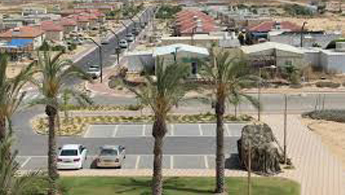
In 2005, families were evacuated from the Gush Katif communities of Atzmona and Netzarim during Israel’s disengagement from Gaza. And while a group of these families could have relocated to
Despite the challenges of living in a volatile border zone, residents remain committed to building a future in Halutza. “To build from the beginning is very special. We started from zero, and the people here are connected to the land and love
The Arava
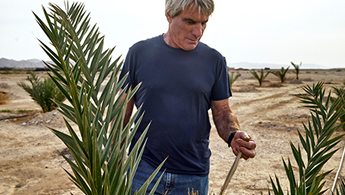
David Ben
Gurion once said, “The State of Israel, to exist, must go south,” and so,
Jewish National Fund heeded his advice and headed south more than two decades
ago.
Somewhat
isolated, unique, and breathtakingly beautiful, the Central Arava is considered
the most remote and peripheral part of Israel. Yet, this arid desert straddling
the Israeli-Jordanian border is home to 8,000 residents living in seven communities,
and although it receives less than an inch of rain per year, the Arava exports
more that 50% of its produce and 10% of its fresh flowers annually to markets
across the globe.
As part of
its Blueprint Negev campaign, Jewish National Fund is focused on efforts
to attract and retain new residents to the Central Arava and has built new and innovative
communities, like Zuqim, on what was once nothing but sand dunes. To increase quality
of life for the region’s residents, JNF built the Danielle A. & Irvine J.
Grossman JNF-Arava Medical Center, a state-of-the-art and well-equipped medical
facility with an emergency call center in the town of Sapir. The new Nancy
Simches JNF-Arava Emergency Response Center, which is currently under
construction and located next door to the Medical Center, will provide a
facility to ensure the safety and security of the Arava’s residents and the
thousands of annual visitors that come to enjoy the many desert adventures the region has to offer.
The Arava
may seem like an unlikely setting for groundbreaking medical and agricultural
research, but major advances are being made at the Central Arava R&D
Center. With JNF’s support, leading scientists are conducting critical research
in the hopes of discovering cures to some of humanity’s most debilitating
illnesses. Agricultural R&D stations throughout the
Arava work closely with local farmers to increase agricultural sustainability
and profitability, all while providing cutting-edge and innovative ways to grow produce in arid conditions and climates.
Jewish
National Fund is steadily working to improve the quality of life in the Central Arava
to attract and retain residents, with many projects focusing on infrastructure,
water, agriculture, research & development, tourism, and more.
YERUCHAM - BUILD IT AND THEY WILL COME.
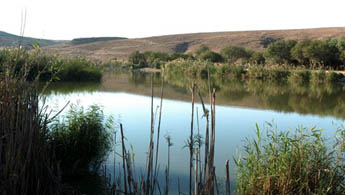
Established 65 years ago in the Northern Negev, Yerucham should, it seems, be a thriving city by now—especially given its natural beauty and proximity to Be’er Sheva, less than 30 minutes away. It’s located in a ridge between two natural resources: the Yerucham Lake Park and the Machtesh Yerusham (Yerucham Crater). However, like many towns of the north and south, Yerucham has been unable to get its younger generation to stay and raise families. To address this, a series of housing lotteries will sell a total of 3,400 new housing lots by 2020. A portion of the properties offered in each lottery is being reserved for members of present Yerucham households and special needs applicants.
Of course, there need to be compelling reasons for people to stay and settle in Yerucham. The town government’s City in the Heart of Park project calls for a large-scale recreational area modeled after the Be’er Sheva River Park. This massive public space will surround the current cityscape with a green perimeter, bike paths, picnic and nature areas, sporting facilities and new bodies of water. Additionally, a new hotel, several agricultural projects, and the opening of new IDF bases nearby will also fuel future growth.
“We’re working closely with Yerucham’s Mayor, Michael Biton, to make the city an exciting, vibrant alternative for young professionals and families who might otherwise leave for Tel Aviv or other cities,” says Geri Shatz, JNF Yerucham Task Force Chair. “We also encourage financial support of the Beit Zvi Youth Center, which is doing great work to create a compelling younger community there.”
EXPLORING BE’ER SHEVA’S WATERFRONT REVIVAL
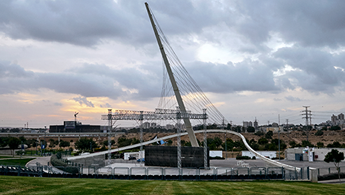
A once barren graveyard for junkyard cars is being transformed into a vibrant, 1,300-acre water-front jewel in the Negev. And Jewish National Fund is leading the way. Our vision for the once-troubled city of
The centerpiece of JNF's efforts in the city is the development of the 1,300 acre
Perhaps one of the most stunning aspects of the River Walk project is Abraham’s Well, equally important to Jews, Christians and Muslims. Here, Abraham is said to have dug a well and made a pact with the Philistines. Today, visitors enter a multimedia-filled courtyard, reconstructed with ancient drawings, that evoke the
A more modern, though no less striking, architectural aspect of the River Park is the Danielle A. and Irving J. Grossman JNF Amphitheater. With its 12,000-seat central amphitheater and two grass amphitheaters hosting a total of 18,000 additional people, it is Israel’s largest and arguably most impressive entertainment venue. From music to theater and dance, this amphitheater is at the heart of all things cultural in
Work is also underway on the Be'er Sheva River Park Lake. Known as Neve Midbar, or "desert oasis" in Hebrew, the 23-acre lake will be Israel's largest man-made lake. More importantly, the lake will double as a reservoir to irrigate and care for the park's needs. Water for the reservoir will be supplied by treated and recycled sewage and waste water from the city.
Though these marvels of urban renewal have already transformed
SUPPORTING THE BEDOUIN COMMUNITY
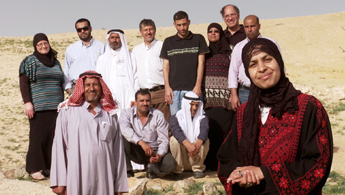
The needs of the Bedouin community and the changes that must come about are one of the original pillars of Blueprint Negev. Jewish National Fund is serious about addressing these challenges and is working with several Bedouin communities to effect change. Our leadership meets with regional councils regularly to assess community needs and to develop solutions.
Jewish National Fund is a proud partner in Project Wadi Attir, a joint initiative of the Bedouin municipality of Hura and the Sustainability Laboratory, a U.S.-based nonprofit. Project Wadi Attir aims to establish a model for a radically innovative, sustainable desert farming operation that will contribute to the well-being of the Bedouin community of the Negev by creating stable income sources, fostering employment opportunities for women, increasing education, and assisting with capacity-building.
We respect Bedouin culture and our investment is designed to leverage Bedouin values, aspirations, and experience in desert agriculture with sustainability principles and cutting-edge approaches to animal husbandry, renewable energy production, resource recycling, soil enhancement, and arid land stewardship. Developed and driven by the Bedouin community, the project demonstrates a self-reliant approach to social and economic advancement faithful to key aspects of Bedouin tradition.
Jewish National Fund has also embarked on a $7 million program to clean the river and create shoreline promenades in Rahat. In coordination with the Abu Basma Regional Council, which represents 80,000 Bedouin, JNF and our partners are funding projects in infrastructure development and education advancement much needed by this Negev population. The cornerstone is the Abu Basma Regional Council Complex/Medical Center. The land has already been donated by JNF, which will also provide infrastructure development and landscaping. This center would become a focal point for centralized services, and a medical clinic would help alleviate the overcrowding at area hospitals as well as create a training ground for new doctors and nurses from the Bedouin community. Proposed additional services include a fire-fighting station and employment–training center. JNF is proposing a joint plan with the Abu Basma region to tackle the issues of water supply and treatment, as well as the creation of parks and play areas.
Nearby, Segev Shalom is a Bedouin village of 10,000 in the Negev. Jewish National Fund funded a central park complete with an amphitheater around the community’s town hall. Additionally, one of our partners in research and development, the Arava Institute for Environmental Studies, is working on several projects with the Bedouin to improve the quality of their lives.
We have also partnered with CISCO Israel, community organization Eretz Ir, and the Lauder Employment Center in Be'er Sheva to deliver workplace training and skills, employment networking opportunities, and additional resources for the Bedouin population to be able to find good jobs.
The annual Clean Up The World campaign, a day of clean up worldwide held every September 20, is led in Israel by JNF. Every year Bedouin children are part of the growing number of students, soldiers and adults who clean up forests, open spaces and residential areas.
EMPLOYMENT AND ECONOMIC DEVELOPMENT
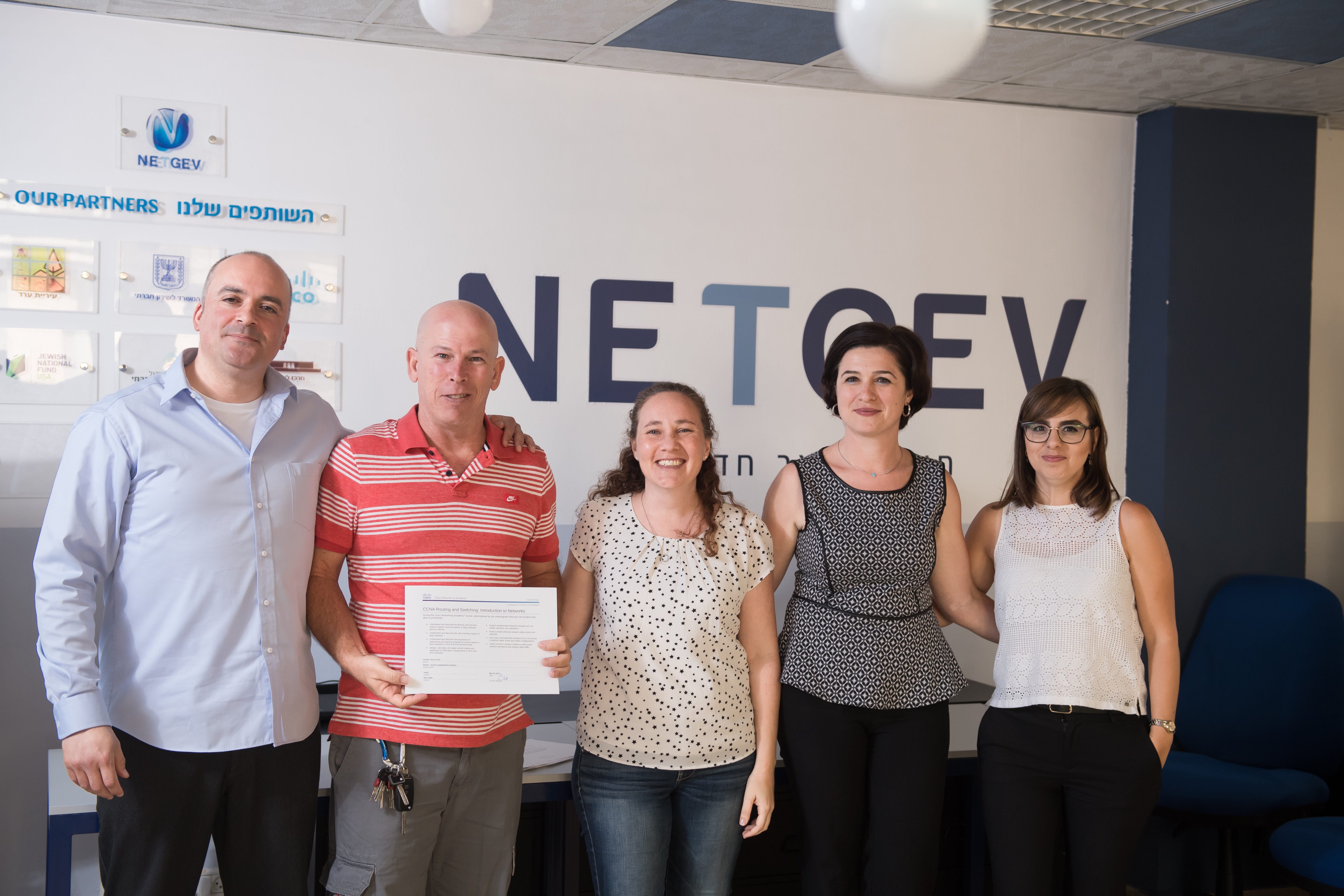
In order for cities in the Negev to prosper and grow, young adults and families must see cities in the Negev as viable and desirable places to live, with ample opportunity for employment, high quality of life, and upward mobility. Jewish National Fund works with local residents to propel education and economic change from the bottom up, motivating new populations to settle in cities that now offer opportunities that match the crowded Tel Aviv-Haifa-Jerusalem corridor.
Jewish National Fund dedicated the Lauder Employment Center in 2015 to offer comprehensive career services, guidance, and resources to students and alumni of area universities, as well as to assist businesses throughout the Negev to find qualified employees. By creating partnerships between Negev employers, employment agencies, and potential employees, JNF is increasing the number of people finding jobs, while improving employer and employee satisfaction. The Lauder Employment Center also created the Negev Human Resources Forum, the Employment Agencies Forum, and job matchmaking networks that have served over 300 employers and 350 job seekers.
Equally as important are the NetGev Hubs, which provide affordable work spaces for local entrepreneurs, as well as practical, technical and educational training that enable local residents to work in hi-tech sectors – something that previously was only possible in the center of the country. Since its launch in 2017, NetGev has provided courses and lectures for over 325 people, and rented out Hub space for 21 remote workers. The project is developing innovative employment opportunities, with the goal of becoming both a national and global resource for online services and remote workers.
PROVIDING SAFE LEARNING AND PLAY IN THE GAZA ENVELOPE REGION

To make a lasting difference in the area, Jewish National Fund-USA built the GrooveTech, dedicated in honor of Betsy Fisher, to provide children with a safe indoor playground and innovative learning center. GrooveTech will help bring a sense of normalcy to local families and will become the only place in Israel with a full, state-of-the-art afterschool science education program.
GrooveTech will provide a safe and welcoming space in which children can thrive during the day and after school hours. The facility will offer innovative learning experiences that integrate play with education, while developing creativity, communication, and collaboration skills. The center will be used by Eshkol’s three elementary schools and will be open to the general community as well.
GrooveTech will help to ensure that children build healthy life skills and mature into high functioning adults who can reach their potential. Without a facility such as this, local families will not have a place to sing songs, do projects, learn science, participate in art, and more. GrooveTech is essential to bringing joy and a growth mindset to local residents.
The two-story structure houses rock climbing walls, virtual reality rooms, a planetarium, science and robotics spaces, art workshops, and more. Activities involve critical thinking, problem solving, and decision-making skills, as well as encourage responsibility, tolerance, entrepreneurship, and curiosity.